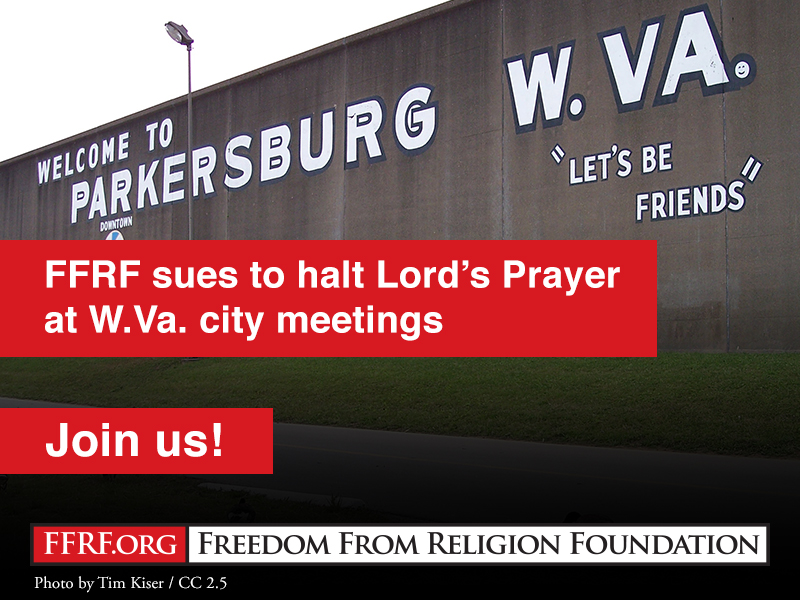
The Freedom From Religion Foundation is redoubling its efforts to immediately halt a West Virginia city council from unconstitutionally praying at every meeting.
The city of Parkersburg has adopted and instituted an official Christian prayer — the “Lord’s Prayer” — that opens each City Council meeting, with city residents encouraged to join in. FFRF and two local residents filed a lawsuit in July in the U.S. District Court for the Southern District of West Virginia, Charleston Division asserting that the prayers breach the First Amendment, and also seeking a preliminary injunction to prohibit the council from continuing its practice. The city of Parkersburg filed a brief on Sept. 10 opposing the injunction. FFRF has now filed a reply brief in support of its requested relief.
Last year, in Lund v. Rowan County the 4th U.S. Circuit Court of Appeals (under whose jurisdiction West Virginia falls) held that sectarian legislator-led prayers were unconstitutional. The court opinion said, “The principle at stake here may be a profound one, but it is also simple. The Establishment Clause does not permit a seat of government to wrap itself in a single faith.”
FFRF is taking its cue from this court decision.
“Because this practice is unconstitutional under Lund, the court must preliminarily enjoin the practice to protect plaintiffs from continuing violations of their constitutional rights,” FFRF asserts in its reply brief.
The local plaintiffs include Daryl Cobranchi, who has frequently attended meetings and been directed to stand for the Lord’s Prayer, a practice, he notes, which has made him conspicuous by his nonparticipation and which “assigns to second-class status anyone who is not Christian.” Likewise, Eric Engle, also a Parkersburg resident, follows city matters and has felt uncomfortable and pressured to participate in the Christian prayer during public meetings. Both men are FFRF members.
This religious ritual is alienating to non-Christian residents.
“The City Council’s adoption of the Lord’s Prayer as its own promotes Christianity,” the brief contends. “The in-unison recitation of the Lord’s Prayer by the City Council and meeting attendees at every meeting portrays the Lord’s Prayer as the official prayer of the city.”
The magnitude of official endorsement of a particular religion is disturbing.
“The City Council has not only controlled the content of the prayer, it has adopted the Lord’s Prayer as an official prayer through repeated recitations in unison at bimonthly meetings for years,” the FFRF brief points out. “This level of government interaction between religion and government is a flagrant violation of religious establishment under the First Amendment.”
The effect is to make the Parkersburg City Council meetings akin to a Christian church service. And what makes it worse is the official coercion. For instance, at one meeting, Councilman Eric Barber stared in a pointed fashion at attendees who did not participate in the prayer and shouted “Amen” into his microphone at the conclusion of the prayer.
FFRF maintains that because the plaintiffs have demonstrated a likelihood of success on the merits, they are entitled to a preliminary injunction, which would directly address the actions of the City Council members and their unconstitutional practice of leading Christian prayers at each meeting.
FFRF, acting as a plaintiff in the case as well, is a 40-year-old nonprofit corporation that advocates for the separation of state and church and educates on matters of nontheism. FFRF has over 32,000 members nonreligious nationwide, including more than 100 members in West Virginia.
Last year, FFRF sued Mercer County Schools, W.Va., in a high-profile lawsuit to end 75 years of bible indoctrination in public schools there.
Marcus B. Schneider, Kristina Thomas Whiteaker, and FFRF Attorneys Patrick C. Elliott and Christopher Line are co-counsel on the case.
